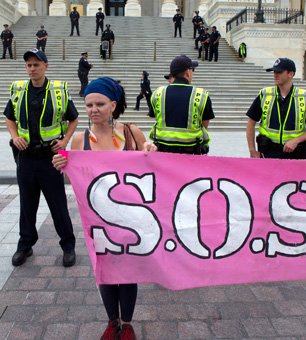Support justice-driven, accurate and transparent news — make a quick donation to Truthout today!
I’ve been thinking in odd moments about my professional state of my mind, and thought I’d share a bit. (I know, too much information.)
A starting point: It is a truth not universally acknowledged that it’s possible to be a highly successful academic and still have a somewhat fragile sense of self-worth. You get your papers published, you get tenure, maybe you win some prizes; all this says that your colleagues believe that your stuff is right, that you really do know something about your subject.
But do you really? Or are you just good at self-marketing?
Some — maybe many — academics don’t care; they’ve carved out a nice career and life, so it’s all good. But if you are truly serious about your work as opposed to your career, the question of whether your knowledge is real is always with you.
As you’ve already guessed, I’m talking to some extent about myself. I’ve always been very serious about my work, and I’ve always tried to be more than a mere careerist. I’ve had a wonderful career, getting all the major gongs, yet as late as 2008 it was still possible for that small self-doubting voice in my head to whisper that being a facile modeler and a pretty good writer might not mean that I really knew how the world works.
And then the crisis came — a crisis that was very much up my alley. I got obsessed with Japan in the 1990s, and I think I can fairly claim to have started the whole modern liquidity-trap literature. I approached the Japan problem the way I approach just about all economic problems, by building a stylized, minimalist model that seemed to make sense of the available facts and yielded strong conclusions.
But does this style of analysis work in the real world?
Well, events provided an acid test. Those who believed in the little models I and others were using made some very striking predictions about how the world would work post-crisis. These predictions were very much at odds with what other people were saying: that trillion-dollar deficits would not drive up interest rates; that tripling the monetary base would not be inflationary; that cuts in government spending, rather than helping the economy by increasing confidence, would hurt by depressing demand, with bigger effects than in normal, non-liquidity-trap times.
And the people on the other side of these issues weren’t just academics; they were major-league policy makers and famous investors.
And guess what: the models seem to work. It appears that I wasn’t just a successful self-marketer, that I really did and do know something.
So that’s great — except that it turns out that one form of anxiety has just been replaced with another. It’s great to have confirmation that you weren’t just playing career games; it is, however, not just frustrating but terrifying to watch decision-makers ignore all the hard-won evidence and knowledge, and repeat the mistakes of the 1930s.
Media that fights fascism
Truthout is funded almost entirely by readers — that’s why we can speak truth to power and cut against the mainstream narrative. But independent journalists at Truthout face mounting political repression under Trump.
We rely on your support to survive McCarthyist censorship. Please make a tax-deductible one-time or monthly donation.
